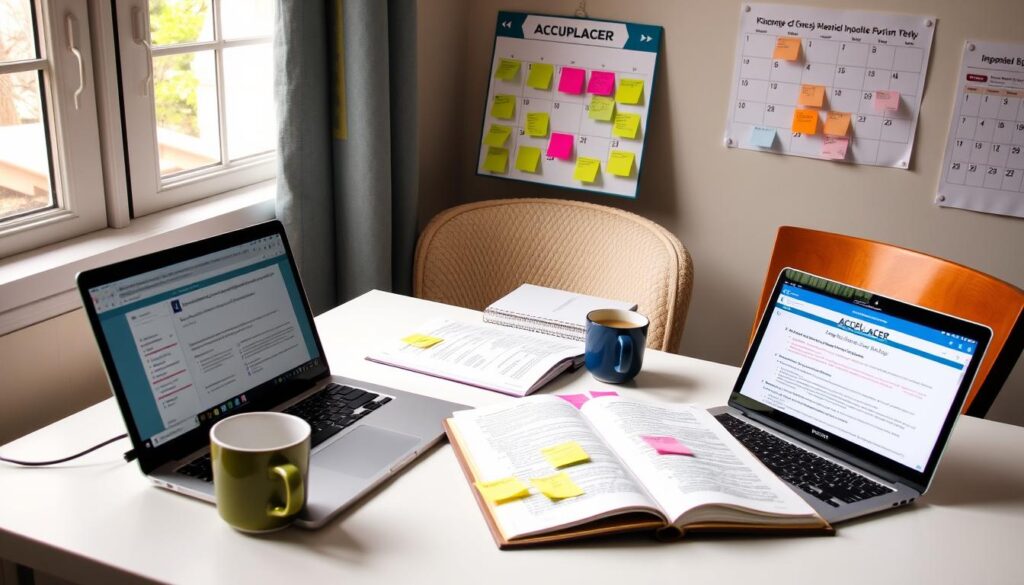The college placement exam, often the ACCUPLACER, checks if students are ready for college. It looks at reading, writing, and math skills. This test helps place students in the right classes based on their skills and readiness.
It covers many topics, from simple math to complex algebra and statistics. The questions change based on how well a student does.
Knowing the exam well helps students do well on test day. This guide will help you understand the ACCUPLACER. You’ll learn how to tackle the college placement exam syllabus with confidence.
Key Takeaways
- The ACCUPLACER is a computer-adaptive placement test that assesses a student’s readiness for college-level coursework in areas like reading, writing, and math.
- The ACCUPLACER consists of multiple tests, including Reading, Writing, Arithmetic, Quantitative Reasoning, Algebra, and Statistics, as well as Advanced Algebra and Functions.
- The placement tests cover a wide range of topics, from basic arithmetic to advanced algebra and statistics, with the difficulty level adjusting based on the student’s performance.
- Understanding the structure and content of the ACCUPLACER is crucial for students to prepare effectively and ensure they are placed in the appropriate courses.
- The ACCUPLACER is designed to evaluate a student’s academic skills, not to pass or fail, with the scores reflecting their individual skill levels.
Understanding the ACCUPLACER Placement Tests
Test Overview and Structure
The ACCUPLACER placement tests check a student’s reading, writing, and math skills. They help decide the right college course for the first year. The test has several parts, like Reading, Writing, and Math.
Students might also need to write an essay. This is to see how well they can write.
The ACCUPLACER adjusts its questions based on how well you do. This makes sure the test shows how ready you are for college.
- The Sentence Skills section features 20 questions of two types.
- The Reading Comprehension test includes 20 questions of two types.
- The Arithmetic test has 17 questions divided into three types.
- The Algebra part of the test consists of 12 questions.
The Arithmetic questions cover whole numbers, decimals, and problem solving. Algebra questions deal with numbers, expressions, and solving equations.
The test is done on a computer. It’s self-paced and multiple-choice. The questions change based on your answers, making the test accurate.
“I scored high enough on the Accuplacer test to get into the college math class I needed to take.”
It’s good to know what the test covers. The goal is to find the right course for your skill level. Give yourself at least two hours to take the test. This helps you not feel rushed.
Preparing for the ACCUPLACER Tests

To do well on the ACCUPLACER tests, it’s key to prepare well. Start by learning what the tests cover. Practice with sample questions and use study materials and online tools.
Getting help from an ACCUPLACER tutor can be very helpful. Varsity Tutors offers private classes. These classes focus on reading, writing, and math, which are key areas tested.
Make sure to book your test time with your college’s advising office. This gives you time to prepare and ask about any special help you might need.
“Spending more time on ACCUPLACER prep correlates with better test day preparation.”
Being proactive and putting in effort to prepare can really help. It can lead to better scores and the right college courses for you. This sets you up for success in college.
The ACCUPLACER exam tests your skills in various subjects. Colleges use it to place you in the right courses. High school advisors use it to suggest college levels. With certified tutors, you can get personalized help to reach your goals.
College Placement Exam Syllabus

The college placement exam, like the ACCUPLACER, tests many subjects and skills. It covers Reading, Writing, Arithmetic, Quantitative Reasoning, Algebra, and Statistics. Each part checks different knowledge and skills, like understanding information and solving math problems.
Knowing the exam’s syllabus helps students prepare better. It shows them what they need to work on. This way, they can focus their studying and do well on the test.
| Subject | Content | Sample Topics |
|---|---|---|
| Reading | Comprehension of information and ideas |
|
| Writing | Evaluation of rhetoric and language skills |
|
| Arithmetic | Operations with whole numbers, fractions, and decimals |
|
| Quantitative Reasoning, Algebra, and Statistics | Problem-solving with algebraic and statistical concepts |
|
Understanding the exam’s syllabus helps students prepare. It shows them what they need to work on. This way, they can focus their studying and do well on the test.
“The placement exam is designed to evaluate a student’s preparedness for college-level coursework, ensuring they are placed in the right classes to set them up for success.”
Test Day and Score Interpretation

What to Expect on Test Day
On test day, students need a valid photo ID. They must leave personal electronic devices, like cell phones, outside the room. Calculators are usually not allowed, but math sections might have on-screen calculators.
If you need disability accommodations, contact the college’s testing services early. This ensures you can make the necessary arrangements.
Understanding Your ACCUPLACER Scores
After taking the ACCUPLACER test, students get their scores. These scores don’t mean “pass” or “fail.” They show the student’s skill and knowledge level, helping place them in the right courses.
The ACCUPLACER tests cover reading, writing, and math. They are used by colleges and technical schools worldwide.
The tests use computer-adaptive testing (CAT). This means the questions get harder or easier based on your answers. It gives a more accurate and personalized test.
The ACCUPLACER tests are carefully checked for fairness and accuracy. Experts review the test content to make sure it’s fair for everyone. They also look at how different groups do on the test to make sure it’s fair.
Even though ACCUPLACER scores are linked to college success, high school GPA is a better predictor. Students with higher high school GPAs usually do better in college. But, ACCUPLACER scores still offer valuable insights into a student’s readiness.
Also Read : TSA Exam Syllabus: Subjects and Topics to Focus On
Conclusion
Mastering the college placement exam, like the ACCUPLACER, is key for students. Knowing the test’s layout, what it covers, and how it’s scored helps. This knowledge lets students create a solid study plan.
Good prep includes looking at sample questions and practicing important skills and knowledge. Getting help from academic advisors is also crucial. It ensures students are in the right courses for their level and sets them up for success.
With the right approach, students can do well on the placement exam. This is a big step towards their educational and career goals. By mastering the ACCUPLACER or similar exams, students can confidently start their college journey.
Students can get advising and counseling help or prepare on their own. Those who are proactive and well-informed are likely to do well in college. They can reach their educational dreams.
FAQs
Q: What is the math placement assessment and why do I need to take it?
A: The math placement assessment is a standardized test used to determine your current math skills and to place you in the appropriate course level. Many colleges require this assessment to ensure that students enroll in courses that match their skills, which can lead to a better chance of passing and completing their degree.
Q: What are the placement testing options available at my college?
A: Placement testing options can vary by institution but often include assessments like the ACCUPLACER math test, ALEKS, or other specific standardized tests. Please visit your college’s assessment center or website for a complete list of options and details on how to proceed.
Q: What basic skills are evaluated during the math placement assessment?
A: The math placement assessment typically evaluates basic skills in areas such as arithmetic, algebra 1, and college algebra. The results help determine the level of mathematics instruction you need to succeed in your future courses.
Q: Is there a fee to take the math placement test?
A: Many colleges charge a fee to administer the math placement test, while some may offer it for free. It’s best to check with your specific college’s assessment center to find out if there is a fee associated with the test.
Q: What happens if I fail the math placement assessment?
A: If you fail the math placement assessment, most colleges will allow you to retake the test after a certain period or suggest that you enroll in a basic skills program to improve your skills before attempting the assessment again.
Q: Can I use a calculator during the math placement test?
A: The use of calculators during the math placement test depends on the specific guidelines set by the college. Some assessments may allow handheld calculators, while others may not. Please check with your college for their specific policy.
Q: How do colleges use my test scores from the math placement assessment?
A: Colleges use your test scores to place you in appropriate courses based on your current skill level. This ensures that you are enrolled in a program that meets your educational needs, which increases your chances of success in completing your degree.
Q: What should I do if I believe my current test scores do not reflect my abilities?
A: If you believe your current test scores do not accurately represent your math skills, you can often request a retest or discuss your options with an academic advisor at your college. They may recommend additional study resources or placement testing options.
Q: How can I prepare for the math placement assessment?
A: To prepare for the math placement assessment, you can review the topics covered in the test, practice with sample questions or online resources, and consider enrolling in a preparatory course or program. Many colleges also provide study guides or resources specifically designed for their assessments.
Source Links
- https://www.mometrix.com/academy/accuplacer-test/
- https://accuplacer.collegeboard.org/students/prepare-for-accuplacer/whats-on-tests
- https://belmontcollege.edu/app/uploads/2014/02/Accuplacer-Testing-Study-Guide.pdf
- https://www.mathhelp.com/accuplacer-math-test-prep/
- https://accuplacer.collegeboard.org/educators/whats-on-tests
- https://www.varsitytutors.com/accuplacer-prep
